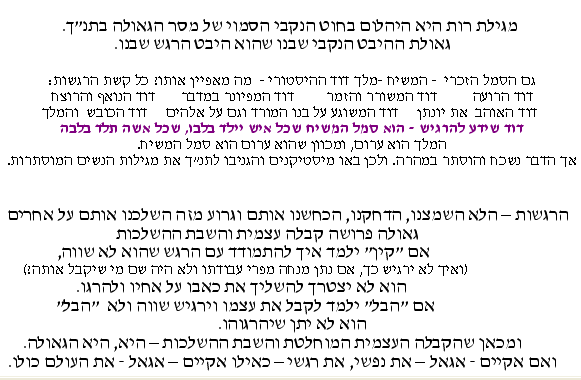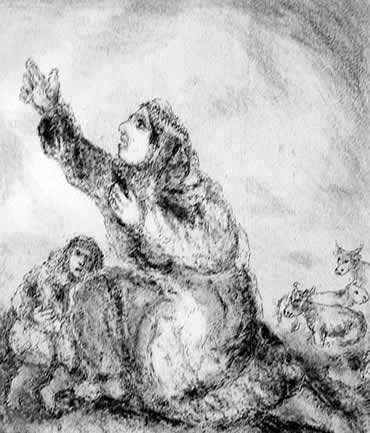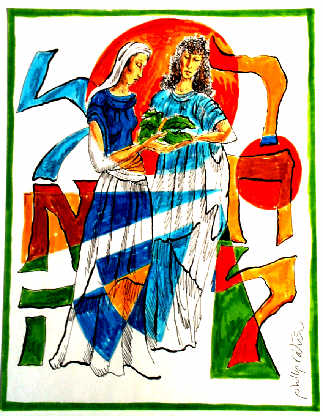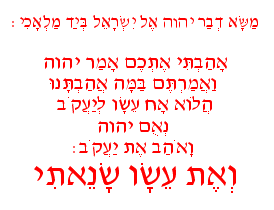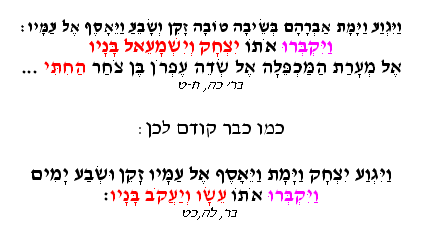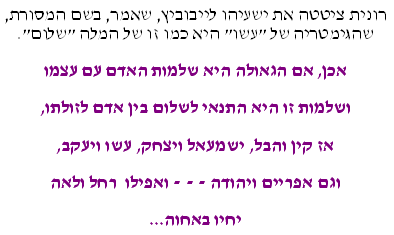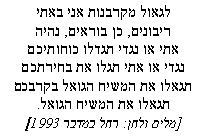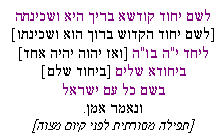| The
Purpose of HEALING - K.I.S.S.
- as stated 12 years ago - was and is
to help me and my potential P E E R s
"to HEAL ourselves into WHOLEness,
and - by extension - all of CREATion!" |
|
I focus my experiencing and awareness on being
"a pioneer of Evolution
in learning to feel":
I let my Body vibrate and my Heart 'womb'
pain, shame, fear, boredom, powerlessness,
so feelings can >heal >guide>fulfill>evolve,
and ~~~ offer ~~~"goldmines"~~~ to us all!!
"I
want you to feel everything, every little thing!"
|
|
| |

2004~~~Dedicated
to my daughter-in-love Efrat-Rut ~~~2011 |
|
MESSIAH Bat-Sheva &
David or The
HIDDEN FEMALE THREAD of REDEMPTION in the BIBLE
2004
Preface
blue links - mainly English
orange links - mainly Hebrew
|
|
|
|
|
|
|
|
|
|
|
|
|
|
|
|
|
|
|
|
|
|
|
|
|
|
|
|
|
|
|
|
|
|
|
|
MESSIAH DAVID
AND BATSHEVA
INTERPRETATION 2004
 Third
Page
Third
Page
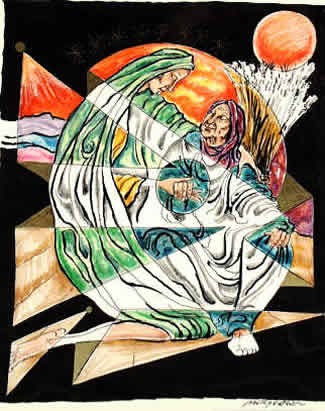
Phillip
Ratner: Naomi and Ruth
Why
couldn't Naomi simply ask the relative of her husband, if he was ready
"to redeem" her land,
by marrying the widow of her son?
No, but thus he would have forfeited the main message contained in
the "Tamar Scroll",
which in turn interpreted the most shameful behavior ever reported
about anybody in the Bible:
that of David and Bat-Sheva against Bat-Sheva's husband Uriyya.
see
"Megilat" Bat-Sheva and The
Bible of Feelings
For the scandal wasn't only in the fact, that the King of a harem
of women
coveted the one wife of a high-ranking officer [2
Sam 23:39] in his presently fighting army,
fucked her and then caused that soldier to be killed, i.e. murdered
covertly.
The biblical story , told so bluntly and bravely in the context of
the David drama,
grossly pitches the solidary behavior of the Canaanite soldier
against the anti-solidary behavior of Israel's King.
When
"the woman" tells
him she is pregnant, David feels (at least) embarassed.
What to do?
Since Yo'av is responsible for fighting his war, the king has time
for schemes:
He sends to Yo'av, commanding him to order Uriyya the Hittite to come
to him.
What follows now, is best quoted word by word...
[I mostly adopt Everett Fox' translation]
When Uriyya came to him,
David inquired after the shalom
of Yo'av, the shalom of the -people,
and the shalom of the battle,
then David said to Uriyya;
Go-down to your house and wash your
feet!
Uriyya went out of the king's house...
but Uriyya lay down at the entrance to the king's house, with
all his lord's servants,
he did not go-down to his house.
They told David, saying:
Uriyya has not gone-down to his house.
David said to Uriyya:
Isn't it from a (long)journey that you
have come?
Why haven't you gone-down to your house?
Uriyya said to David;
The Coffer and Israel and Judah are
sitting in huts,
my lord Yo'av and my lord's servants are camping on the surface
of the open-field -
and I, I should come into my house
to eat and to drink and to lie with my wife -
as you live, as your
(very) being lives - were I to do this thing...!
David said to Uriyya:
Stay here today as well; tomorrow I will send you back.
So Uriyya stayed in Jerusalem on that day and the next..
David had him called, and he ate and
drank in his presence, and he made him drunk.
And he went out at sunset to lie down
in his lying-place with his lord's servants;but to
his house he did not go-down.
So it was in the morning
that David wrote a letter to
Yo'av and sent it by the hand of Uriyya;
he wrote in the letter, saying:
Put Uriyya right at the front of the
battle, the strongest-point,
and turn-back behind him ~~~~~so that he is struck-down and
dies!
|
|
The
value of solidarity,
later captured in the proverb:" Kol
Yisrael arevim zeh la-zeh"
that intrinsic value of Israel,
which made me Christa, Christian and German, become Rachêl,
Jewish and Israeli,
was so vital for Uriyya
- that no king, not even the future Messiah,
could command him to violate it.
Uriyya, of Canaanite background, bore a Hebrew name, which means "God's
Light "
It is easy to judge David's behavior
and whenever reading, feeling the story, I cannot help but judging
with utmost disgust.
Some later stories - attachments to the biography of David in the
books of Samuel, -
try to soften the judgment by depicting David as the proponent of
solidarity.
See the story about the cistern of Bethlehem (!) in Bethlehem&David
The relevant question, relevant for my present life, is,
how was it exactly this scandal that was to become the seed for redemption?
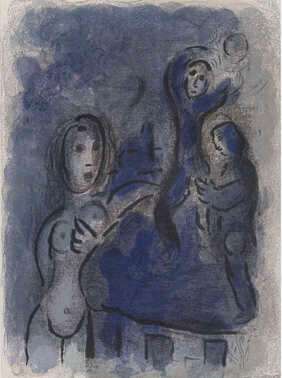 |
In
another mystical genealogy, that of Jesus Christ,
[right
at the beginning of the New Testament!],
the clear lineage between the scandalous women
from Tamar
to Ruth
to "the
one who had been the wife of Uriyya"
was preceded by yet another less than proper woman,
Rahab,
who in the original context was a Canaanite whore
in Jericho. [Josua
6]
Small wonder, that the Christ himself then
was not the fruit of a proper marriage...
How
odd,
that nobody seems to be shocked by this improper pedigree,
neither Jews nor Christians.
And how sad, that nobody seems to ask what this implies
and how what it implies must be applied,
applied in our lives. |
Nor have I ever heard someone ask the question:
Where was Bat-Sheva, "the woman" , in this story?
How did she - contrary to her husband - obey the king's command,
though it violated the simpliest of human laws and the ten commandments
among them:
Do not fornicate!
Any other woman would have been stoned to death for her consent.
In many societies, up to this day, even a girl, not yet married,
if raped,
is finished for the rest of her life.
But the Bathing Bat-Sheva?
Is she a nothing? without any will or courage of her own?
When later it comes to the question of who should be the king's heir,
she can very well stand up for her son Salomo, or rather bow down
before the king,
and demand that their common son be the heir and implicitly the "Son
of David",
the symbol of the future Messiah. [1.Kings
1: 16]
Viewing Bat-Sheva as the metaphor of all the will-less, self-victimizing
women everywhere,
must have enraged someone terribly, or - enlightened!
He (she?)
created a woman, totally the opposite of Bat-Sheva: Tamar.
"Megilat"
TAMAR
Tamar, Bat-Shua's daughter-in-law, didn't covet someone who didn't
belong to her,
Dressing up as a whore and ambush her father-in-law to tempt him to
impregnate her
was a thought, a decision , an act of brave self-determination,
to get what was her right: a son from Yehuda's family.
Except
for Rachel the shepherdess, Devorah the prophetess and some queens,
women in the Bible [see The
FiRST WOMEN ] have no profession nor function
but to give pleasure to men and produce their progeny.
Their worth and self-worth was totally dependent on having children.
Even if a woman was ardently loved by her husband, like Rachel or
like Hannah,
she found no compensation, no self-worth in being loved,
she wanted children!
And
Yaakov fell in love with Rahel...
So Yaakov served seven years for Rahel,
yet they were in his eyes
as but a few days,
because of his love for her....
and he loved Rahel also,
more than Lea...
When Rahel saw
that she could not bear (children)
to Yaakov,
Rahel envied her sister.
She said to Yaakov;
Come-now, (give) me children!
If not, I will die!
Yaakov's anger flared up against Rahel,
he said;
Am I in place of God,
who has denied you fruit of the body?
[Gn 29: 18.20.29; 30:1-2] |
|
...
for it was Hanna (that) he loved,
although YHWH had closed up her womb.
and her rival-wife would vex her with vexation, ...
for YHWH had closed up her womb;
and thus was done, year after year:
as often as she would go up to the house of YHWH,
thus would she vex her.
and when she wept and would not eat,
Elkana her husband said to her;
Hanna, why do you weep? why don't you eat?
And why is your heart in such ill-humor?
Am I not better to you than ten sons?
Hanna arose .... and she was bitter of feelings,
so she prayed to YHWH,
while she began-to-weep, yes, weep.
[Samuel I, 1:5-9] |
Rahel
and Hanna - merged in Chagall's creation - aren't they the female
Kayin?
So what less shamefull choice did Tamar, the widow , have
but making herself a whore to her father-in-law?
But
the meaning is deeper:
How come, that from among the numerous wifes and sons of David,
it was exactly the son of this shameful liason between the king and
that widow,
who became the heir, Salomo
or Shlomo [from the word shalom=wholeness, peace]?
And as the heir, the true "Son of David", the metaphor of
the future Messiah, the redeemer?
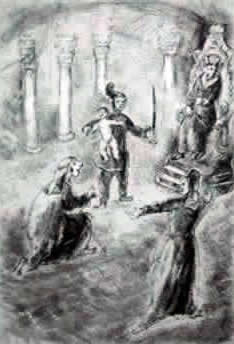 |
While
searching for an image of Salomo or Shlomo [from the word
shalom],
I found out, that the artists - like Chagall - considered
only one scene worthwhile painting:
and this scene - again - has to do with women whose only reason
for existence are children,
the more so as they are whores !!!
Then
came there two women that were harlots, unto the king, and
stood before him. And the one woman said:
O my lord, I and this woman dwell in one house; and I was
delivered of a child with her in the house. And it came to
pass the third day after that I was delivered, that this woman
was delivered also:
and we were together; there was no stranger with us in the
house, save we two in the house. And this woman's child died
in the night; because she overlaid it. And she arose at midnight,
and took my son from beside me, while thine handmaid slept,
and laid it in her bosom, and laid her dead child in my bosom.
And when I rose in the morning to give my child suck, behold,
it was dead; but when I had considered it in the morning,
behold, it was not my son, which I did bear.
And
the other woman said, Nay; but the living is my son, and the
dead is thy son. And this said, No; but the dead is thy son,
and the living is my son.
Salomo
then issues his famous judgment. A sword is brought and he
suggests to "divide
the living child in two, and give half to the one, and half
to the other."
The mother of the living child whose
"bowels yearned upon
her son", preferred
the child to be given to the other mother alive instead of
having it killed.
|
The
writer of Megilat-Rut did not want to go as far as the author of "Megilat"-Tamar
It was enough in his/her eyes to depict a situation,
which had the potential of ending shameful, but didn't.
The
shame is redeemed in the utter dedication of the Moabite woman to
her Jewish mother-in-law.
"Her love to you is more than ..."
say the neighbors to Naomi,
the one time, that the word "love" is used in the Rut-Scroll.
Isn't
love to a mother-in-law about the last category of love existant on
this planet?
but that is the point the author wants to make!
Not
the love to her husband - the names of Naomi's sons indicate their
lack of stature -
nor the love to Boaz!
It's the love between a Moabite daughter-in-law and
a Jewish mother-in-law
that gave birth to the Messiah.
Isn't there a hint in the very fact,
that "Kalah"
means both: bride and daughter-in-law?
Or as I prefer to say: "daughter-in-love"...
In this bravery and love of Rut and Naomi the first women are redeemed
too:
Rachel and Lea figure greatly in the wedding blessing.
"And all the people that were in
the gate, and the elders, said, We are witnesses.
The LORD make the woman that is come into thine house
like Rachel and like Leah,
which two did build the house of Israel:
and do thou worthily in Ephratah, and be famous
in Bethlehem:
And let thy house be like the house of Peretz,
whom Tamar bare unto Judah,
of the seed which the LORD shall give thee of this young woman."
See Bethlehem-EFRATA
What
a pity, that this blessing was not adopted by Jewish tradition.
Instead the couple is blessed in the name of two men, Efraim and Manasseh...
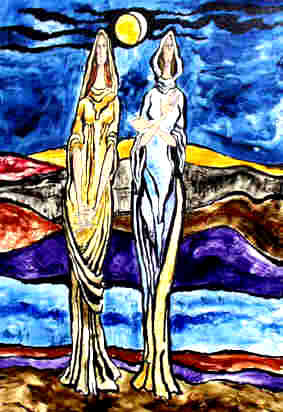
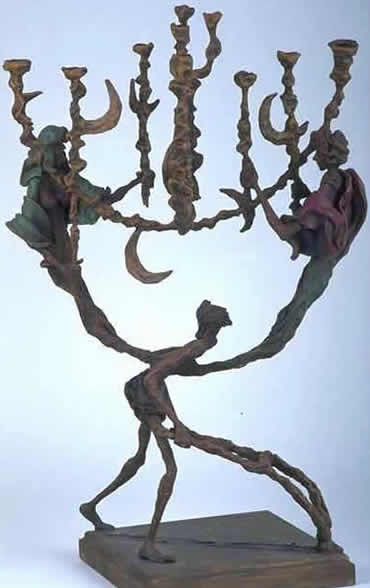
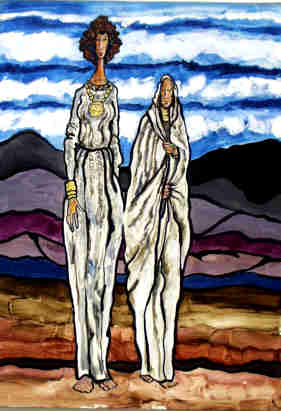
One last
triptych has created itself, all images by Phillip Ratner:
The sculpture of
Lea and Rachel, equally connected to Ya'aqov underneath them (!),
seems to manifest the strong claim of Rut's author, that Lea and Rachel
BOTH built Israel,
and the similarity between Lea
and Rachel and Naomi and Ruthin the two paintings,
doesn't it indicate, that the love between the latter will once become
true between the former?
For next in line to the proverbal hatred between mother-in-law and
daughter-in-law
is the hatred between Rachel and Lea, Lea and Rachel, the wifes of
the same man and even sisters.
|
Re'uven
went in the days of the wheat-harvest (Rut!)
and found some love-apples in the
field
("duda'im",
the same root as "david")'
and brought them to Lea his mother.
Rahel said to Lea:
Pray give me (some) of your son's love-apples!
She said to her;
Is your taking away my husband such a small thing
that you would now take away my son's love-apples?
Rahel said:
Very well, he may lie with you tonight
in exchange for your son's love-apples.
So when Yaakov came home from the fields in the evening,
Lea went out to meet him and said;
You must come in to me,
for I have hired, yes, hired you for my son's love-apples.
So he lay with her that night.
And God hearkened to Lea,
so that she became pregnant and bore Yaakov a fifth son
.(Gn30, 14-17) |
|
Lea
makes me cry and Rachel too.
My Bedouin friend
Hamda in the area of "Succah
in the Desert" did not talk to her husband Jum'aa for
2 years, after he had brought home a new wife, without even
having consulted her.
The Bedouin women, whom I am meeting now (see "Mount
Ararat Evolution", all claim, that they have no problem
with their husband having taken a second or even third wife.
But this is always a lie....
The reason for taking a new wife is often, that no children,
or not enough sons were produced by the former wife.
But it's
not the oppression by the men, which I becry - it's the mutual
oppression between the women instead of solidarity, which hurts
the most.
|
It is
the woman who needs to redeem herself,
and
it will be the woman who will redeem the man.
And
with the woman - Feelings and Body
and with Body - Passion...
Jews
and Christians (and Muslims?) believe in the resurrection of the body,
illogical as it seems and totally opposed to the contempt and abuse
that Body is exposed to .
But this belief has been like a secret left for this time to reveal
itself:
there cannot be redemption without Body.
Body
is the Master Healer of Creation, says "God".
This
of course is not contradicting the metaphor "David the King".
On the contrary, it is lightening up the entire image of this king.
On 9/11
someone said, that every historic event finds its historian..
But
unlike the historians of the world who report exterior events or the
evolution of trends,
the
biblical "historian" shows us a person with the whole rainbow
of feelings
[completion
still missing]
from
EFRAT'S MESSAGE
So why is the
Bible interested in telling us Kayyin's genealogy
and mention 6 times his Canaanite wife Bosmat (same ending
as in Efrat)?
And why are Esau and Ya'aqov together and equal
in burying their father?
Just as Yishmael and Yitzhaq were together and equal
in burying their father?
Ronnit, my
daughter quoted Jeshayahu Leibowitz as pointing out,
that the numerical value of Esau was "shalom", wholeness
and peace.
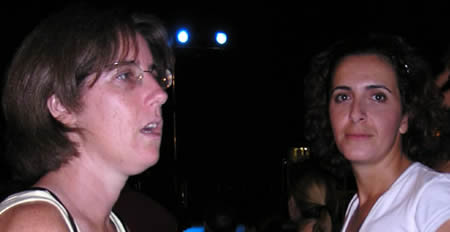
my daughter and my daughter-in-love
And indeed,
if the redemtion means wholeness between me and myself
and this wholeness is the condition of peace between me and
everyone else,
then Kayyin and Hevel, Yishma'el and Yitzhaq, Esau and Ya'aqov,
and also Efrayim and Yehuda --- and even Rachel and Lea
will live in wholeness and peace.

|
|
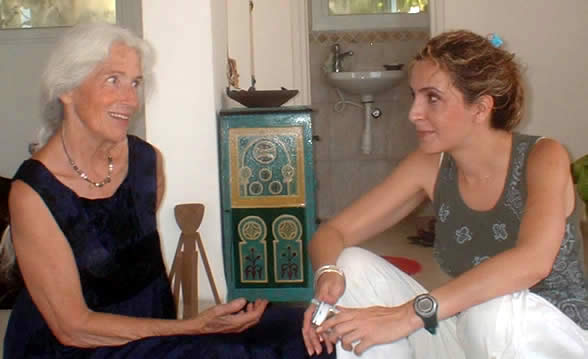
Efrat-Rut's Birthday: Tomer's photos
on the background of the sink in the toilet and the Galilee towards
the Hermon mountain and Syria
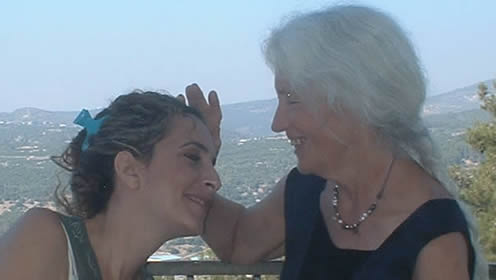
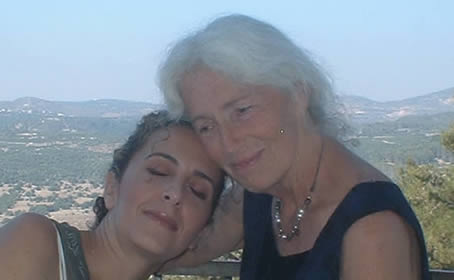
I
breathe, I move, I sound ~~~ Heaven to Earth



